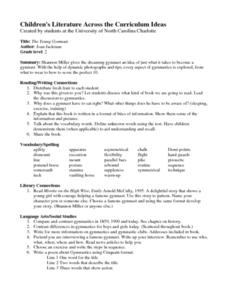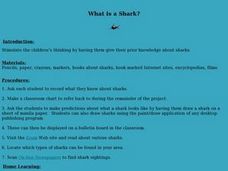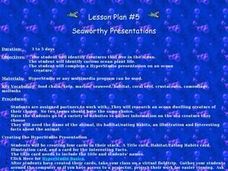Curated OER
Fire Safety Songs (And Poems Too)
Students discuss fire safety tips. They practice singing songs and discuss what to do in the event of a fire. They take a quiz to end the lesson.
Curated OER
"Colors" a poem by Shel Silverstein
Students collect data, graph it, and use the data to find measures of central tendencies, and find probabilities.
Curated OER
Discovering Angel Island: The Story Behind the Poems
Learners watch a video, view websites, and discuss the Chinese Exclusion Act that took place on Angel Island. For this Chinese exclusion act lesson plan, students discuss the interrogations that went on and fill out worksheets bout the...
Lafayette Parrish School System
Teaching Tone and Mood
Tone and Mood are not synonymous! Introduce young readers to these literary devices with a series of exercises that not only point out the significant differences between the terms but also shows them how to identify both the tone and...
Scholastic
Ready to Research Owls
Researching facts about owls can be a hoot for your class. Let them wisely collaborate on this writing project. The resource is the second part of three parts. It is best to use all three lessons in order.
Curated OER
The Young Gymnast
Second graders compare and contrast gymnastics in 1859, 1900 and today. Students contrast differences in gymnastics for boys and girls today. Students pretend that they are interviewing a famous gymnast and write up their interview....
Curated OER
Leprechaun Legends
Explore the world of leprechauns. Learners do research on the folk tales, symbols, and characters found in Ireland's traditional stories, poetry, and music. They create a large, stand-up leprechaun to illustrate their knowledge about...
EngageNY
Developing Reading Fluency: Beginning the End of Unit 2 Assessment
Third graders continue to develop their reading fluency in preparation for their assessment in the tenth lesson plan of this unit. Young readers are provided with a short passage on Helen Keller, which they use while working in pairs...
Facing History and Ourselves
A Scene from a Middle School Classroom
Citizens in the modern world can't imagine making the same social choices made by many Germans in the 1920s and 1930s, but they don't realize that they actually do it every day by ostracizing others. A case study of middle schoolers...
Curated OER
Computers in the Classroom
Tenth graders identify and interpret modern poetry through exploration with guided instruction. Students use the Encarta Encylcopedia site to explore further modern poetry and locate poetry that inspires them. Students identify themes...
Curated OER
Figurative Language Lesson
Seventh graders write figurative descriptions of common objects using complete sentences. They read and interpret the figurative language of a poem.
Curated OER
What a Garden Can Teach Us
Third graders read "Seedfolks" and "What a Garden Can Teach Us" and discuss how a garden is like a community. They create a class quilt illustrating how their classroom community the lines of the poem.
Curated OER
A Rose Is a Rose
Flowering learners explore the concept of figurative language as it relates to poems, songs, or creative written expression. In this creative writing lesson, they complete several phrases using similes, metaphors, and...
Curated OER
Symbolism Bookmarks
Middle schoolers create a bookmark about symbolism. In this literature-based lesson plan, students study the meaning of the word symbolism. Middle schoolers read and analyze the symbolism found in "The Raven" by Edgar Allen Poe. Then...
Curated OER
A Box Of Crayons
Students draw self-portraits on die-cut crayon patterns after hearing the poem "A Box of Crayons" in this Art lesson for the elementary classroom. The lesson is ideal for celebrating Martin Luther King Day and includes extra resource...
Curated OER
Ancient Peoples of the Middle East
This is an excellent multidisciplinary lesson designed by Scientific American. It provides three creative activities--designing a garden, studying hieroglyphics, and writing poetry--relevant to the ancient peoples of the Middle East....
Curated OER
Early Industrialization
Eighth graders analyze primary source documents emphasizing young people in factory labor (mill workers during 1840-1860). They study hours of labor, ages of laborers, reasons for working, and working conditions. They write a poem or song.
Curated OER
How I Became Me
Students examine their own identities and read about the experiences of adopted Chinese daughters celebrating the Jewish rite of passage, the bat mitzvah. They write personal poems or speeches illustrating how their identities evolved.
Curated OER
A Nation in Mourning
Students reflect on what the deaths of John F. Kennedy Jr., Carolyn Bessette Kennedy and Lauren Bessette mean to them. They then work to compose and read aloud found poems from The Times' coverage of the burial and memorial services.
Curated OER
"Five Little Seeds"
Fourth graders complete various activities related to the plant life cycle. They read the book "The Tiny Seed," read and discuss the poem "Five Little Seeds," complete a "Plantenstein Mystery" and other online activities, write and...
Curated OER
Moving West
Students research the Westward Movement and struggles encountered by the pioneers as they moved from Nebraska, Westward along the Oregon Trail. In this Westward Expansion activity, students read an Oregon Trail poem and visit 5 different...
Curated OER
Wild Wonderful Walk
Students explore the outdoors. In this poetry lesson plan, students spend time outdoors and write a poem about what they felt and saw. Students can do this activity in pairs or alone. Students blindfold their partner to focus on sounds...
Curated OER
What is a Shark?
Students discuss their knowledge of sharks. In this shark instructional activity, students read about various sharks and look up shark sightings in an online newspaper. They create Shark-shaped poetry.
Curated OER
Seaworthy Presentations
First graders research ocean animals and plants on the web. In this ocean habitat lesson, 1st graders prepare a multimedia presentation. Students will work on their presentations in pairs and every group should have its own...























